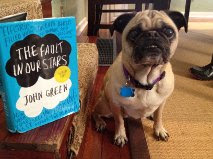 |
| Cancer books don't have to suck |
I love John Green.
Since I taught high school for so many years, my classroom library had 2 copies of Looking for Alaska (which I loved!), a copy of An Abundance of Katherines (which was fun), and at one point I had a copy of Paper Towns (which was okay). Students checked these books out so often that I had a waiting list for them. I even showed the Vlog Brothers Catcher in the Rye segments to my 11th graders to hear John Green's witty banter and literary insights for Holden Caulfield. I laugh at it every year as my students sat blurry eyed and a bit overwhelmed by Green's diatribe.
Last year when Amazon.com publicized advanced orders for John Green's, The Fault in Our Stars, I ordered my signed copy the first day. Then, Time magazine called it one of the best books of 2012. It arrived at my house with John Green's green scrawled signature. I read it in a day.
And . . . I didn't like it.
I kept my thoughts to myself knowing that the Nerdfighters I had in my 10 Honors English class would be disappointed in my reaction to a book I knew they would love - which they did. They LOVE, LOVED it. Many of them wanted to revive Augustus Waters and marry him. When I read it the first time, I only saw John Green's face every time Augustus spoke. I didn't buy the sappy romance between Augustus and Hazel. I thought the inclusion of Peter Van Houten, the deeply flawed author of Hazel's favorite book, An Imperial Affliction, both silly and annoying. When my Augustus Waters lovestruck teenage students asked me, "So, Mrs. Thiegs, what did you think of The Fault in our Stars?" I felt my face pucker wanting to tell them something different than my honest opinion. Somewhere in the gene pool, though, I was not granted with the "sugar coat it gene" which would be quite helpful in not alienating people when I tell them what I really think. I told them that I didn't like it. I told them why. They looked at me crestfallen, and replied, "You just don't get it because you aren't a teenage girl." True. I am not a teenage girl, but I loved Looking for Alaska, and that is totally YA angsty and wonderful.
I've watched as The Fault in our Stars has achieved best seller status. I read a report that a movie is in the works. I have seen it over and over again on "The Best of 2012" lists from various sites. I didn't get it until . . . I reread it again for my book club.
I erased my previous opinions of the book and read it with an open mind - not the mind of a 16 year old girl (because I am not 16, nor would I want to be again), but I was able to really focus on what draws readers into the story. Hazel, Augustus, Hazel's parents, and Isaac are really cool characters, and John Green showcases his brilliance all over the place in this book. The second time through, I appreciated his delicate touch with this being a cancer book that is anti-cancer books, because as Hazel mentions, "cancer books suck." Still the two main characters, Hazel and Augustus have this "Imperial Affliction"- the big c - and they are both able to see into the world differently than other teenagers. They meet at a cancer support group and romance ensues. Their romance is not a typical teenage romance because they are both cancer patients, Augustus is the healthier of the two when they first meet. Although Hazel pushes him away when she starts to fall for him, telling him that she is a grenade, ready to blow up all those around her who love her, Augustus can't help loving her anyway, and she can't help loving him. Which might be the reason for the title, The Fault in our Stars. It is a fault that we can't help loving who we love, or that innocent, really cool kids sometimes get horrible cancer. The dizzy hand of fate touches us in numerous ways that we can't always control. Augustus, being the totally mature and amazing guy that he is, even arranges through the Make a Wish Foundation, to take Hazel to Amsterdam to meet the author of her favorite book (a cancer book that is not a cancer book called An Imperial Affliction written by Peter Van Houten). She needs to find out what happens to the characters, and she needs to hear it from the author.
I will admit that the second time through, knowing the ill fate of Augustus and Hazel, I got teary eyed at the blossoming of their tender love. I shivered knowing the fate of these characters who I fell in love with this time around, and I cried at the end of the book with the touching words and again the innocence of those who suffer so much for no real reason.
So. . . I am happy to report that I highly recommend The Fault in our Stars. It is indeed a cancer book that does not suck.




